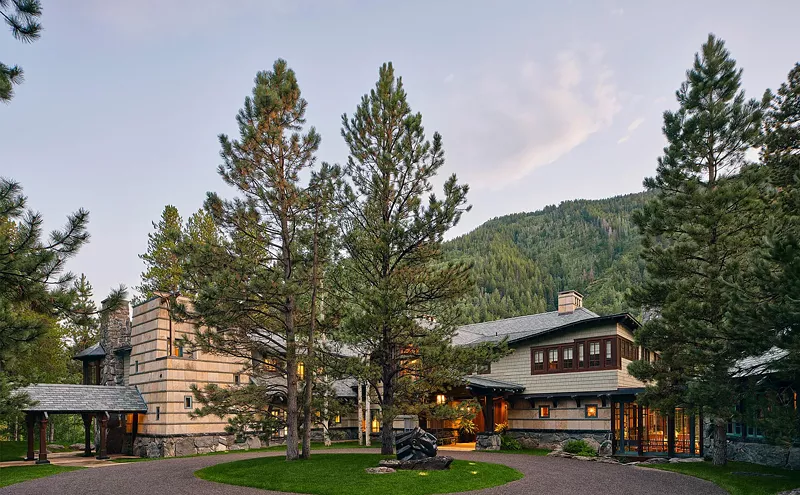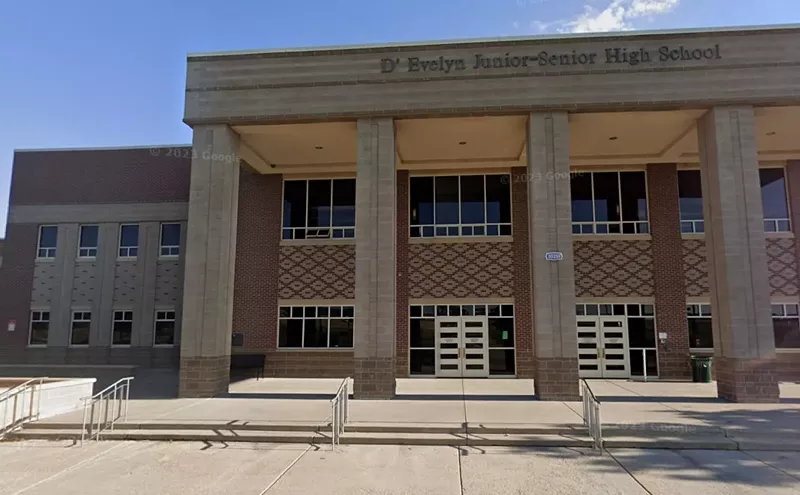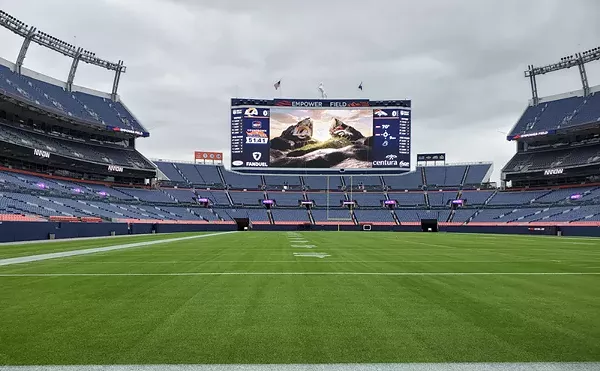Last year, in a game with playoff implications, Castillo made a poor decision. It was the eighth inning, tie ballgame, man on second, batter at the plate. Castillo was catching when the hitter knocked a single to the outfield, sending the runner around third and hurtling toward home. The throw came in wild, flying all the way to the backstop, and the runner glided safely across the plate. Since Castillo couldn't stop the go-ahead run, he did the next best thing: He collected the ball out of the dirt and fired it as hard as he could at the jubilant runner, who was still jumping in the air in celebration. The ball hit the runner squarely in the chest. Castillo was ejected from the game.
A few years back, bad behavior was the norm at league games: arguments on the field, fistfights with umpires, the occasional drunken infielder. But these days it's all business for La Liga, a wildly popular, sixty-team Hispanic league that stretches all the way from Pueblo to Greeley to Grand Junction and back. The quality of competition is high -- ex-big-leaguers-in-the-league high -- and so are the expectations. So Acosta must hammer home las reglas to make sure that everyone is on the same page and things run smoothly. If you're going to stay after the game and drink and watch other games, don't just throw your bottles under the car and then drive off, he explains in Spanish. Unless your wife has a vendor's permit, ask her not to sell burritos in the city's parks. Leave the fields in good condition for the next team. These are rules that would seem obvious to those reared in the American athletic environment of permission slips, facility fees, licenses and athletic regulations. But in a league where the games can be as much cultural gathering as competition -- in a league where many fans re-create the atmosphere they fondly remember from their childhoods in Mexico, where attitudes were a bit more carefree -- such bureaucratic obligations must be reiterated.
Some of the team reps listen attentively, nodding their heads. Others from the better, Class AA squads yawn and roll their eyes; they've heard this all before. For these former college athletes, the more pressing issue is wooden bats, which the league is using for the first time this year in an attempt to curb the profusion of home runs. Several men from the lower division -- men wearing goatees, ball caps, cowboy hats and belt buckles, men of all shapes and sizes, a couple of whom don't look fit enough to last three innings -- completely ignore the speech, letting their cell phones interrupt with a variety of festive ring tones.
After Acosta finishes his talk, the relieved room explodes with chatter. Friends who haven't seen each other since last October embrace. Shortstops from rival teams commence yet another season of epic shit-talking. Men rush the table at the front of the room, snatching schedules, rosters and boxes of brand-new white baseballs.
Tomorrow is opening Sunday of La Liga Latina de Béisbol, and everyone is ready to play ball.
For Gabe Molina, La Liga Latina is a layover. He hopes. A former star pitcher from Kennedy High School turned major-league closer, Molina has been in more than forty games for the Baltimore Orioles, Atlanta Braves and St. Louis Cardinals. But now, at thirty -- "not old but definitely not young by any means" he says -- he's at a crossroads in his career, released earlier this spring from the Colorado Rockies organization after pitching for the Sky Sox in Colorado Springs.
"I've still got a lot left in the tank," Molina says. "I had a good season there last year, did well and everything. They just wanted to go in that young direction instead of having veteran players. Every team has a certain direction, and you just have to understand that."
For a while, it looked like the only direction for Molina was up. Selected by the Baltimore Orioles in the 21st round of the 1996 draft, he steadily worked his way through the farm system from rookie league to A ball to AA, then AAA with the Rochester Red Wings in 1999. He was called up to the bigs that same season, playing twenty games for Baltimore and posting a 1-2 record with a 6.65 earned-run average.
"I'll never forget that first day I was called up," Molina says. "I was warming up, and the players were tossing the ball around, and Cal Ripken Jr. was playing third. When it's time to start pitching, the third-baseman throws the ball to you. So I turn to catch the ball from third and it hits me: ŒHoly shit! That's Cal Ripken giving me the ball! I'm in the big leagues!'"
But life in the big leagues is a tenuous dance, and Molina shuffled between AAA teams and their major-league counterparts in Atlanta and St. Louis for the next few years. During 2004 spring training, he injured his elbow and had to sit out the season after coming home to Thornton for surgery. Last year, the Sky Sox had him for a few months, but now Molina is without a team and still ready to play, a phone call away from dropping everything and joining a professional squad.
"If I get a call and a team needs an arm, even if it's overseas or in Mexico, I'll go out and play," he says. "I'm in a holding pattern right now, waiting to see if anything will happen."
While he waits, he's got to keep his arm active, so he's moonlighting for the Cervezeros (that's Spanish for Brewers), one of the top teams in La Liga, characterized by seasoned ex-college players who are all capable of wielding a dangerous bat.
"The most important thing for me to do is throw in a game situation, and I really can't do that anywhere else right now," Molina explains. "Plus, I've got a lot of friends in the league, friends from high school, a lot of guys who didn't get a chance to play ball after college, so I enjoy playing in the league very much.
"It's also because of my heritage," he continues. "I'm Hispanic, and these games are a lot of fun. It's a whole different experience than the average American game. It's a much livelier environment. You go out and play, then you have a big cookout after the game with friends and family and everything. My parents love going to these games. This league has grown a lot since it started. It's got to be one of the best amateur leagues around."
One that got a little better with the addition of Molina. Although he'd played a bit in La Liga when he was sidelined in 2004, he didn't want to use his recovering arm to pitch. But this time around, Molina's focus is pitching, and after he plays seven innings in right field during the Cervezeros home opener in Broomfield -- a game the day after Acosta's informational meeting, one that pits the older, wiser and a-few-pounds-heavier Cervezeros against the younger, faster, upstart Indios -- he finally steps onto the mound to close. The Cervezeros have worked their way to a 5-0 lead, not putting many hits into the outfield with those new wood bats, and it's Molina's job to protect that lead.
Players from across the league have come to this early-morning game just to see Molina close. They huddle around Joe Renteria, a former North High School assistant baseball coach whose son, Alonzo, pitches for last year's league champions, the Yaquis de Piria. Renteria is standing behind the backstop with a radar gun.
Molina's first pitch is a blistering strike down the middle. His next throw is a ball.
"Oooh, look at the star," a woman taunts him in Spanish, after Molina's heater rises high.
He pays her no mind and strikes out the first batter with ease, his fastball surging into the low 90s. The next batter hits a grounder to second base, but the fielder botches it, and the runner makes it to first. A passed ball moves the runner to second, and several pitches later he steals third. But then Molina strikes out the batter with a stinging 92 mph pitch. The next batter goes down in four pitches. Inning over.
"He was averaging 88 mph," Renteria says. "And his off-speed stuff was moving all over the place."
At the bottom of the eighth, Molina steps into the batter's box. He's already struck out twice today while filling in as a right-fielder, and the Cervezeros decide to remind him of it. All of the players step out from the dugout and stand in the dirt on the first-base line. They take off their red baseball hats and shake them back and forth at Molina.
"They're calling for a hat trick," Renteria explains with a laugh. "He's struck out twice, and they want him to fan a third time."
Molina smiles at his teammates -- some are friends he used to play with back at Kennedy -- and then hits a ball straight at the right-fielder, who catches it with ease. Not a strikeout, but not a hit, either.
"They love to get on me because I used to be a really good hitter," Molina says. "But playing professionally as a pitcher, you don't get much of a chance to get hits. These guys just love to give me a hard time."
He may have gotten Ken Griffey Jr. out back in the day, but here, on this sunny Sunday morning, he's just another one of the boys.
The origins of La Liga Latina de Béisbol in Colorado are murky. Some say the league was formed in 1973; others swear it was 1980. Some say the league started small, with four teams; others contend there were ten right off the bat. But according to "Una Pequeña Historia de la Liga Hispana o Latina de Colorado" -- a time-weathered document written in Spanish by former league president Jesus Ibarra and pasted to a piece of cardboard, then handed down president to president, manager to manager -- the league was born in 1979 when then-president Don Nato Lucero allowed six squadrons to compete under his reign.
"The league was really good right from the start," says Rogelio Contreras, a legendary figure who played from the very get-go, went on to manage eight teams and still helps run the league. "We had a lot of players who played in school, good umpires, and there were so few teams it was easy."
The league quickly grew in popularity until 1988 -- when suddenly it stopped cold. It couldn't sustain itself, but no one is sure why. Contreras thinks it suffered from growing pains: too many teams, not enough fields, players with bad attitudes, chaotic games. In 1990, two new presidents, Oscar Sedillos and Rudy Vasquez, resurrected the league, managing to field 22 teams. Organization improved, as did quality of play, and there were as many as thirty teams in the league in 1996. That's when the league decided to unofficially change its name to La Liga de Rogelio Contreras.
"It was an honor," says Contreras, who was raised in Mexico, played in Texas before moving to Colorado and is now 73 years old.
In 1996, Jose Acosta joined the league, hanging up his playing cleats for a position as league secretary, then president.
Like Gabe Molina, Acosta had flirted with making it big in baseball, too. He was born in tiny Hacienda de Garaboto in Aguascalientes, Mexico, a pueblo known for its picturesque seventeenth-century church and its high-quality fighting bulls. But for a brief period in 1980, the biggest buzz coming out of that town was all about Acosta, a 21-year-old rookie phenom. The kid's fastball had a natural movement that left hitters stupefied at the plate. Acosta also had a quick pick-off move to first that typically caught two to three runners a game. And for 56 glorious innings, he did not allow a single run. (Orel Hershiser currently holds the major-league record for consecutive scoreless innings with 59. The second best was Walter Johnson's 55.2 -- that was in 1913.) At any level of the game, 56 consecutive scoreless innings is nothing short of outstanding, and the big clubs came knocking. Los Rieleros de Aguascalientes signed Acosta to their squad, and he moved to Aguascalientes for spring training with La Liga Mexicana de Béisbol, a league that Major League Baseball considers on par with the Class AAA minor leagues.
"It was so amazing," Acosta remembers. "Even the professional players had heard about what I did. They all knew about the 56 scoreless innings. I couldn't wait to play."
The team finished practice every day by two, and players didn't have to be back at the team hotel until ten. Acosta's home was only a 25-minute bus ride away, so rather than kill time at the hotel, he'd take the bus back to the pueblo every day, then play soccer with his friends to work on his fitness and agility. But during one soccer game, he took a disastrous spill that dislocated the shoulder of his throwing arm, essentially ending his career. Los Rieleros sent him to Mexico City to practice with a national squad bound for a tournament in Japan, but Acosta had lost all of the power in his arm. After a month, the national team's coaches sent him packing.
"I was so sad and disappointed," Acosta remembers. "That was just the best period. They used to broadcast our games on the radio. Man, it was so awesome. And when I had to quit, I couldn't stay around in Mexico. I had to leave."
He came to Denver in 1981 because he had a friend here, and worked as a florist for a year or so before returning to Mexico. But he quickly realized that the U.S. was the place for him, and he came back in 1983, after waiting nearly a month in a shanty in the hills of Juarez for a coyote to bring him across the border illegally.
Back in Denver, Acosta went into the construction business. He married his wife, who is American, in 1986, and got his green card in 1987. By then, he was already playing baseball again.
"A friend told me about La Liga Latina," Acosta says. "And I told him that my shoulder was bad, but he just said to come out anyway, it was just for fun."
His shoulder wasn't as bad as he thought. Although Acosta couldn't pitch anymore, he found that he had no problem firing the ball across the diamond from third to first. He also had good power in his bat, so he stuck around and became one of the best third-basemen in the league, wreaking havoc at Ruby Hill, Barnum East, Montbello, City Park and other fields across the metro area from 1984 through 1993.
"For the longest time, he was the all-star leader that everyone looked up to," explains Luis Canela, a sportscaster for Univision who's been covering La Liga Latina since 1985, first for radio, then for television. "He was a great infielder, an incredible batter. The guy was just very talented. But he could also see the larger picture. He would take youngsters under his wing, teach them skills. I would say he really brought in the showing-respect vibe to the league, and that builds camaraderie. That's probably why there are so many teams in the league now, because under his guidance as president, just like when he was a player, the teams are united."
"When I became the president of the league, I had already experienced how the presidents ran the league," explains Acosta, who was named head of the league in 2002 and runs it with the help of Rogelio Contreras and former manager Javier Olivas. "And they had all done a fine job. But I had two goals: to change the mentality of the players and fans that take part in the bad habits of fighting and drinking, and to have union umpires, not just pull somebody out of the stands."
Today the league has 25 union umpires -- the teams playing each game cover their pay -- and though those umpires can take a lot of flak, they control the tempo of each inning. Players pay fifteen dollars a season to the league, and that money goes toward renting fields, buying trophies and helping teams with uniform costs. In years when there's a surplus, like this year, the extra money funds an all-star team of players from the league on a tour through Mexico, playing professional and semi-professional teams along the way.
Handing out several stiff fines took care of the egregious behavior. "The thing is, now we're all trying to put out a good image," Acosta says. "When you play the right game, with discipline, the players become examples for all the fans in the bleachers. This is what is important to show the community. We can play safe and healthy sports here every Sunday and have a place where the teenagers don't have to go out and do drugs, get into trouble, but just come to a safe place and be with family and friends. They understand it better now."
And the fans are turning out in droves. In late March, a celebration of the upcoming season drew around 7,000 people to Ruby Hill Park in southwest Denver. All sixty teams were there -- forty from the lower division, twenty from the upper crust -- showing off their bright new uniforms ordered on the cheap from Mexico, and each proudly displaying a madrina, a beautiful young woman who serves as the team's queen during the inaugural parade. Univision was there to broadcast the spectacle.
"It was tremendous," Canela reports. "There were American flags out there, Mexican flags, Central American flags, South American flags. Culturally speaking, this league is not only seen as a sport to the community, it's seen as a part of the social life. All these folks are getting together every Sunday April through October, best friends, primos, coming together to eat some carnitas, talk about what happened that week. It's a way to bring the family out and spend some great time together, watching someone you care for do what they love."
Of course, it doesn't hurt that the people they're watching are playing some of the best baseball the league has ever seen. On April 9, opening day, Hiram Loeza, a pitcher from the constantly improving Tarahumaras of the Clase AA Zona Norte, threw the league's first-ever no-hitter at Barnum East.
"It was incredible," says Tarahumaras manager Roberto Porras. "He threw nine innings with no hits and twelve strikeouts. He did a real good job."
A short drive away at Ruby Hill, the Yaquis had a near-perfect outing against the Diamantes, but still only managed to squeak by 4-2, in a season opener characterized by mid-to high 80s pitching, smartly turned double-plays and micro-managed small ball that had several hundred aficionados hanging on every pitch. Many more fans are expected for the highly anticipated match between the Cervezeros and the Yaquis, which starts at 11:30 a.m. Sunday, May 7, at Ruby Hill.
The top teams in La Liga Latina de Béisbol -- the Yaquis, the Indios, the Cervezeros, the Diamantes, the Aztecas, the Granjas, Jerez, Tarahumaras -- all include stand-out high school athletes who went off to colleges like Trinidad State, Otero Junior College, Regis University and Fort Hayes State University in Kansas specifically for baseball, and never quit playing. Their rosters also boast a handful of ex-professionals from various leagues south of the border, done playing for money but far from washed up.
The majority of the league's players, though, are out every Sunday just for the love of the game.
Not Juan Martinez.
The first thing Juan Martinez noticed about this country were the ubiquitous yellow school buses.
"In Venezuela, you had to be rich to ride in a yellow school bus," he remembers. "We all walked to school. But when I got to the United States, when I got to Colorado, there were yellow school buses everywhere, and everyone could ride them. I didn't speak any English at the time, but I learned the ABCs in two days. That type of environment makes you want to study."
Back in Caricuao, Venezuela, Martinez's parents were too poor to fund any sort of decent education for their kids. His father, Hector, worked at home making shoes, even fashioning the cleats that his son used when he played for Los Pirates in the Criollitos de Venezuela, the same youth league that reared Andres Galarraga. Finally, they decided to move the family to Denver, following a relative who'd made the move years before. Martinez came on a vacation visa and has been here ever since, attending Place Middle School, then South and Overland high schools. His senior year at Overland, he started switch-hitting and hit .321 while playing third base and outfield, leading Overland to one of its best records in recent years.
After graduating from high school, Martinez pursued the game full-time. "Playing baseball is what I do the most," he says. "So I traveled all over the state trying to get my name out there. During the summer I would travel to tryouts and camps just to get people to know me."
That's how he wound up at an annual Christmas-time camp in Arizona put on by Mike Ericson, area scouting supervisor for the Colorado Rockies. "These kids come down to the camp and you get attached to a few of them, so you try to help them out the best you can," Ericson explains. "You build relationships with coaches in the area, make a call for the kid, tell the coach he would make a good addition to the team, and nine times out of ten, they'll take him from you. We're not in complete competition with each other. Later on down the road, when some of their guys are draft-eligible, they'll let us know the scoop on their players. It's a two-way street."
Ericson hooked Martinez up with a spot at the now-defunct Arapahoe Junior College, where he hit .270 his first year, .300 his second, but was well-liked because of his defense. "It was great, because I got to get used to more fast pitching than I ever saw in high school," Martinez says. "There, guys were throwing 92-93 miles per hour. It helped me get my bat speed up."
After junior college, Martinez scored a spring-training tryout in 2004 with the Pensacola Pelicans of the American Association of Independent Professional Baseball, a stepping-stone league not affiliated with the majors. The team was only allowed to keep three rookies, and Martinez was the fourth. Although he didn't get a spot on the squad, the team tried to arrange a full-ride scholarship at the University of Mobile in Alabama. But Martinez's non-citizen status prevented him from accepting it.
Since then, Martinez has bounced between squads, playing briefly at Metro and going wherever his few scouting connections lead him. Right now he's a valuable member of the Yaquis. "I'm in this league because I want to work out and practice; being in game situations is invaluable," Martinez says. "But the league is a real exciting league to be in. There's talented people here, especially our team. There's some older players who know so much about baseball. The moment that I'm there on Sunday, I've got one guy telling me about Babe Ruth, another guy telling me about Bo Jackson, one guy suggesting, ŒYou know what's better, Juan, if you keep your hands inside.' I learn a lot."
And he's learning fast. On June 1, Mike Ericson will put on a pre-draft workout at Coors Field, where some of the top recruits in the region will get the opportunity to perform in front of people who can actually sign them. Martinez has been invited.
"I just want to get myself in that bubble," Martinez says. "Because if I was to get signed, they'll work with me to get a visa. I don't care how much they are willing to offer me, I'll play for $1,000. I just want to get signed, get that visa and get that chance."
But it won't be easy. At 22, Martinez is old for a new player getting started in an organization. Clubs are looking at eighteen- and nineteen-year-olds, Ericson says. And visas are in short supply.
"Baseball clubs have X amount of work visas," Ericson explains. "Like any corporation, really. And those are hard to come by. Basically, you have to release a player who has a visa to sign a player who needs a visa. And the competition is stiff, with all the signings in Latin America, even in the far East. Look at our Rockies, with the Kims and Jeff Francis; people forget he's Canadian, he needs a visa. Larry Walker did, too. It's an uphill climb for a lot of guys. I'm not saying this is Juan's last breath, but this is certainly the best chance that's going to come his way for a while."
Martinez remains confident. He's improving his slow foot-speed, which several scouts have criticized, and working his ass off in La Liga Latina to get ready for his tryout.
"My dad is sixty years old now," Martinez says. "I want him to stop working already. Baseball is my only way of doing that."
Sunday afternoon at Ruby Hill, Mexican teenagers in trucks and low-riders cruise around an upper parking lot. More young men in cowboy hats sit in lawn chairs by their vehicles, sipping Tecates and cat-calling at cars full of young women. The girls pretend to ignore them, driving out of the lot, then circling back, then driving through again. "This is the place to be," a young man says with a salute of his beer, smiling widely to reveal an impressive collection of silver teeth.
And there's a reason that this is the place to be, even if the cruisers seem oblivious to it: the Liga Latina de Béisbol de Colorado game being played on the field below the parking lot. The vendors are out in force to serve the baseball fans. Mariachi music mixes with the chimes of the paleterías, portable ice-cream carts pushed by lone entrepreneurs. Nearby, a man sells elotes -- salted, fried chips covered in hot salsa -- next to a portable taquería hawking a variety of tacos -- asada, al pastor, barbacoa and chorizo. No one seems concerned about permits. "They bring that culture from Mexico," Jose Acosta says, surveying a landscape of unlicensed vendors, baseball fans and baseball players. "It's always hard at the beginning to make any sort of change. Besides, though, what is the real purpose of the game? To have fun."
On the field, the Yaquis have a man on first and a man on second, with one out. A line drive up the middle threatens to burst the game open, but an acrobatic snag by the Diamantes' shortstop makes the second out of the inning. By now, the runner from second is halfway to third, certain that he's homeward bound, and in one fluid motion, the shortstop rolls over and tags the bag with his glove. Double play; inning over. The Diamantes fans roar. Fans of the Yaquis, the league champs, mutter in disbelief.
Aquí se habla béisbol.












